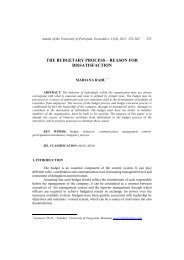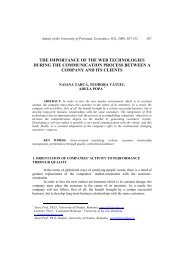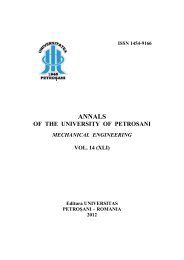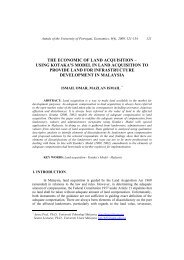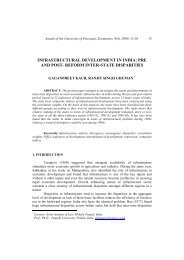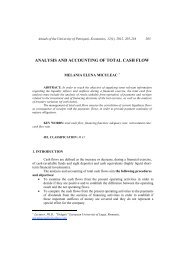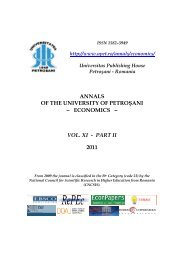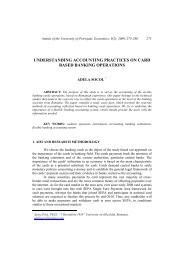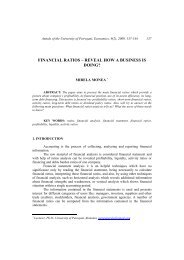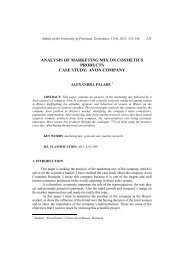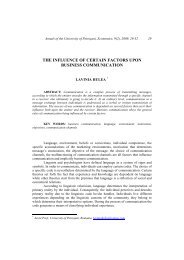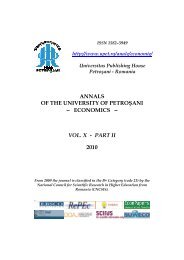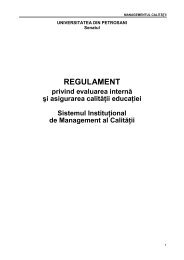annals of the university of petroÅani â¼ economics â¼ vol. xi - part i ...
annals of the university of petroÅani â¼ economics â¼ vol. xi - part i ...
annals of the university of petroÅani â¼ economics â¼ vol. xi - part i ...
You also want an ePaper? Increase the reach of your titles
YUMPU automatically turns print PDFs into web optimized ePapers that Google loves.
26 Biriescu, S.; Butuza, A.<br />
implementing new technologies to increase productivity, increase energy efficiency<br />
throughout <strong>the</strong> production cycle and increase <strong>the</strong> share <strong>of</strong> renewable energy . It will<br />
provide significant support and implement new technologies to reduce emissions<br />
from large power plants. The aim is to contribute to national goals: reducing<br />
primary energy intensity by 40% by 2015 compared with 2001, increase energy<br />
from renewable sources to 33% <strong>of</strong> gross national energy consumption by 2010 and<br />
reduce emissions contaminant in <strong>the</strong> energy sector, according to <strong>the</strong> National<br />
Programmers for reducing sulfur dio<strong>xi</strong>de (SO2), nitrogen o<strong>xi</strong>de (NOx) and dust in<br />
large Exploitation <strong>of</strong> regional advantages is essential, so <strong>the</strong>y are transformed into a<br />
key driver <strong>of</strong> market growth and competition. Starting from <strong>the</strong> conditions that<br />
have to do a region to be competitive in a competitive market (a favourable<br />
business climate, highly skilled workforce and adaptable, adequate infrastructure,<br />
and an innovative environment conducive to quality macroeconomic management),<br />
skills fundamental level would need to cover:<br />
- strategic planning based on analysis <strong>of</strong> advantages and disadvantages - <strong>the</strong><br />
knowledge and commitment to <strong>the</strong>ir strengths and weaknesses and consequently<br />
promote actions: finding workable solutions to improve <strong>the</strong> problems <strong>of</strong><br />
development, operation, strengths and turning <strong>the</strong>m into internationally competitive<br />
advantages;<br />
- culture <strong>part</strong>nership: strategic approach and community in<strong>vol</strong>vement and <strong>the</strong> most<br />
relevant actors at national, regional and local issues so that both common and<br />
specific but different regions and communities to find solutions within this<br />
framework;<br />
- administrative capacity - <strong>the</strong> availability <strong>of</strong> competent personnel at central and local<br />
administrative structures, effective cooperation with <strong>the</strong> private sector as well as<br />
o<strong>the</strong>r interested groups are factors that ensure good management <strong>of</strong> financial and<br />
material resources available to regions;<br />
- innovation capacity, or where appropriate, research and innovation infrastructure<br />
necessary to foster <strong>the</strong> emergence <strong>of</strong> innovation, as a condition for an economy<br />
based on <strong>the</strong> results <strong>of</strong> research and innovation;<br />
- ability to identify resources to encourage <strong>the</strong> emergence <strong>of</strong> new economic activities<br />
and diversification and qualification <strong>of</strong> human resources to adapt to <strong>the</strong> market<br />
needs (by adapting school curricula).Correlated with many objectives <strong>of</strong> cohesion<br />
policy (full employment and active labour market policies, <strong>the</strong> development <strong>of</strong><br />
lifelong learning, research-based economy / development / innovation, sustainable<br />
development), <strong>the</strong> following key competences should be considered, so each<br />
individual, to personal development, as well as at <strong>the</strong> level <strong>of</strong> education and initial<br />
and continuing training:<br />
- ability to adapt and meet <strong>the</strong> challenges <strong>of</strong> a dynamic environment in constant<br />
change through continuous improvement <strong>of</strong> knowledge and specialization in<br />
technical fields, as well as in services, in this context, ICT skills are essential for <strong>the</strong><br />
whole population, contributing to increased information and communication<br />
capacity;<br />
- entrepreneurial skills - key competences required by <strong>the</strong> market economy,<br />
competitive;



